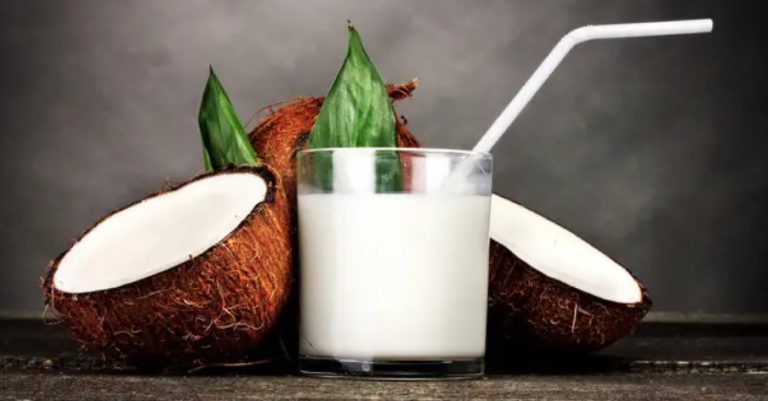Coconut milk has become indispensable as a vegan alternative to cream or for Asian cuisine. But is she healthy? We reveal more about their nutritional values – and the climate balance.
Coconut milk is a popular ingredient in Asian recipes such as curries or soups. Due to the high fat content of the “milk”, coconut milk is an excellent vegan substitute for cream or crème fraîche. However, it is not much healthier – and cultivation and transport are also ecologically questionable.
Coconut milk nutritional values: high in fat and calories

If you only look at the nutritional values of coconut milk, it is no healthier than cream made from cow’s milk. That’s because it’s high in saturated fat, which is considered to be rather unhealthy.
A comparison of the nutritional values of 100 grams of coconut milk and cream (30 percent fat):
Calories: 230 grams (cream: 280 grams)
Fat: 24 grams (cream: 30 grams)
of which saturated fat: 21 grams (cream: 18 grams)
Carbohydrates: 6 grams (cream: 3 grams)
of which sugar: 3 grams (cream: 3 grams)
Egg white: 2 grams (cream: 2 grams)
Fiber: 2 grams (cream: 0 grams)
Coconut milk is particularly rich in biotin. It is important for enzyme synthesis and metabolism. The potassium content is also not to be scoffed at: With 379 milligrams per 100 grams, you can cover a good ten percent of your daily potassium requirement.
Coconut milk also contains the following minerals: calcium, magnesium, sodium and phosphorus.
Coconut milk also contains, among other things:
vitamin C
Vitamin B3
Vitamin B1
Not so healthy: Coconut milk and saturated fat
Coconut milk has a little less calories and fat than 30 percent cream. The components of carbohydrates, protein and fiber, on the other hand, make little difference. But what makes coconut milk less healthy is the type of fat it contains: saturated fat. Not all of the fats contained in the cream are saturated, but in coconut milk they are.
Since saturated fats are considered unhealthy according to many studies, the World Health Organization recommends consuming these fats in moderation.
Coconut Milk Cultivation and Transport: Concerns for the Environment

According to the Okotest, every second coconut product contains harmful substances such as mineral oil, plasticizers or chlorate. In addition, coconut products have a very bad CO2 balance due to the long transport routes. And that’s not all: the growing conditions for coconuts are more than critical because they are being grown on more and more land, with more fertilizer and increasingly in monocultures. This effect is intensified by the fact that the coconut palm grows quite slowly and is not very productive.
It is interesting, however, that coconut milk has a better overall CO2 balance than animal cream. 100 grams of coconut milk emits 0.05 kilos of CO2, and 0.43 kilos for cream.

